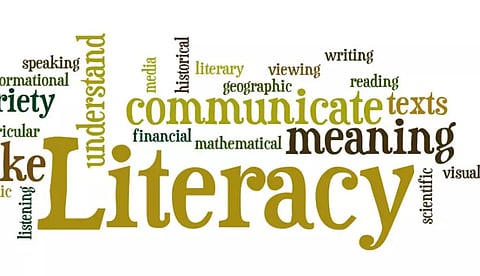
- Home
- Live Blog
- Breaking News
- Top Headlines
- Cities
- NE News
- Sentinel Media
- Sports
- Education
- Jobs

Ranjan K Baruah
(With direct inputs from UN/WHO publication and feedback may be sent to bkranjan@gmail.com)
Where there is literacy, there is progress, but if the literacy is low, then there will be many challenges. It has been seen how societies have been affected due to illiteracy. We have seen many issues and problems due to illiteracy, but the positive news is that we have progressed in the last few decades and literacy rates have improved all over the world, including in India.
We are aware that literacy is central to equipping individuals with relevant knowledge, skills, and competencies, transforming education, and shaping more sustainable and peaceful societies. It contributes not only to generating personal benefits, such as better well-being and economic conditions, but also social, economic, political, cultural, and environmental ones. Evidence shows, for instance, that literacy programmes help enhance democratic values, peaceful coexistence, and community solidarity. By empowering people, especially through a critical and emancipatory approach, literacy can help them engage and assume active roles both locally and globally to face and resolve global challenges’ and to become agents for transformation for more sustainable and peaceful societies.
Since 1967, International Literacy Day (ILD) celebrations have taken place annually around the world to remind the public of the importance of literacy as a matter of dignity and human rights and to advance the literacy agenda towards a more literate and sustainable society. Despite steady progress made across the world, literacy challenges persist, with at least 763 million young people and adults lacking basic literacy skills in 2020. The recent COVID-19 crisis and other crises, such as climate change and conflicts, have been exacerbating the challenges.
This year’s ILD shall be celebrated worldwide under the theme ‘promoting literacy for a world in transition: building the foundation for sustainable and peaceful societies’. The day is an opportunity to join efforts to accelerate progress towards the achievement of Sustainable Development Goal 4 (SDG4) on education and lifelong learning and to reflect on the role of literacy in building more inclusive, peaceful, just, and sustainable societies. The day is celebrated at the global, regional, country, and local levels across the world.
Till recently, we were talking about basic literacy, but at the current time, we have to also focus on literacy so that no one is left behind. The COVID pandemic has taught us the importance of digital skills, and we can also see the digital divide, which affects many people who are economically challenged. SDGs cannot be achieved in the absence of basic as well as digital literacy. Since 1967, the UNESCO International Literacy Prizes have rewarded excellence and innovation in the field of literacy, which has encouraged many individuals and organisations around the world.
When we talk about literacy, another word that comes to mind is also financial literacy, which is equally important. In short, it is important to have all forms of literacy to achieve the SDGs. There are many organisations and even corporations engaged in educational activities to improve literacy in our country. There are opportunities for young people to get engaged in different associations or societies to improve literacy in the country. The literacy rates in the states of Kerala and Mizoram are very encouraging, and in this way, we must achieve 100% literacy in our country.
Studies and reports have shown that people can make smart decisions when they are literate and well educated. We have to ensure that all girls get educated, and the present campaigns and programmes in the country related to girls’ education are bringing positive results. Together, we can make our country completely literate, for which we have to contribute either full-time or maybe in a volunteer way. Like formal schools, there may be innovation and other ways of learning that can engage people and spread literacy in a more effective way.